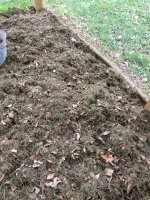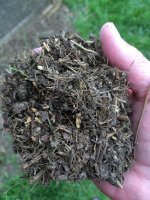MrsAuberry00
Songster
My run is a stinking mess. I've typed that and think it sounds like a hygiene issue, so to be clear, I'm referring to the run in which my chickens live. I've read a lot of threads on here regarding different types of flooring material but it seems most post refer to the COOP where the girls roost and nesting boxes are. I use sand on that floor and pine shavings in the nesting boxes and that is working perfectly, (except for when it rains and leaks into the nesting boxes...then I have the chore of constantly changing out wet shavings for dry, but that's another thread.)
My problem is with the outdoor run. It is a covered dog kennel with hardware cloth skirting, so other than from above, it's totally open to the elements, (again, the RUN, not the COOP.) There is a deeper layer of white driveway rock that was there from years ago and was covered over by dirt. We placed sand in this area as well and at first, it worked great, but over time, the sand has mixed with the dirt, the rain has mixed it into a mucky mess, and the heat has baked it into a hard layer of poo, feed, and impenetrable rock like earth. Now, the chickens have scattered feed all over the area, (because who can eat from the feeder without digging in it and throwing it around like drunken pizza makers might throw dough,) so now there is a stinking mess of poo and now moldering crumble/crumble dust in the run. I don't know how to remedy this so I don't have the monumental task of breaking it up with a shovel and trying to salvage SOME kind of ground cover for the chickens. Someone suggested chopped corn cobs. Anyone heard of this and can you give opinions and suggestions on methods I could try? I've read about the DLM, but it sounds like it's used more in enclosed coops and not element exposed runs? Here it comes...
Chickens are hard.
My problem is with the outdoor run. It is a covered dog kennel with hardware cloth skirting, so other than from above, it's totally open to the elements, (again, the RUN, not the COOP.) There is a deeper layer of white driveway rock that was there from years ago and was covered over by dirt. We placed sand in this area as well and at first, it worked great, but over time, the sand has mixed with the dirt, the rain has mixed it into a mucky mess, and the heat has baked it into a hard layer of poo, feed, and impenetrable rock like earth. Now, the chickens have scattered feed all over the area, (because who can eat from the feeder without digging in it and throwing it around like drunken pizza makers might throw dough,) so now there is a stinking mess of poo and now moldering crumble/crumble dust in the run. I don't know how to remedy this so I don't have the monumental task of breaking it up with a shovel and trying to salvage SOME kind of ground cover for the chickens. Someone suggested chopped corn cobs. Anyone heard of this and can you give opinions and suggestions on methods I could try? I've read about the DLM, but it sounds like it's used more in enclosed coops and not element exposed runs? Here it comes...
Chickens are hard.






